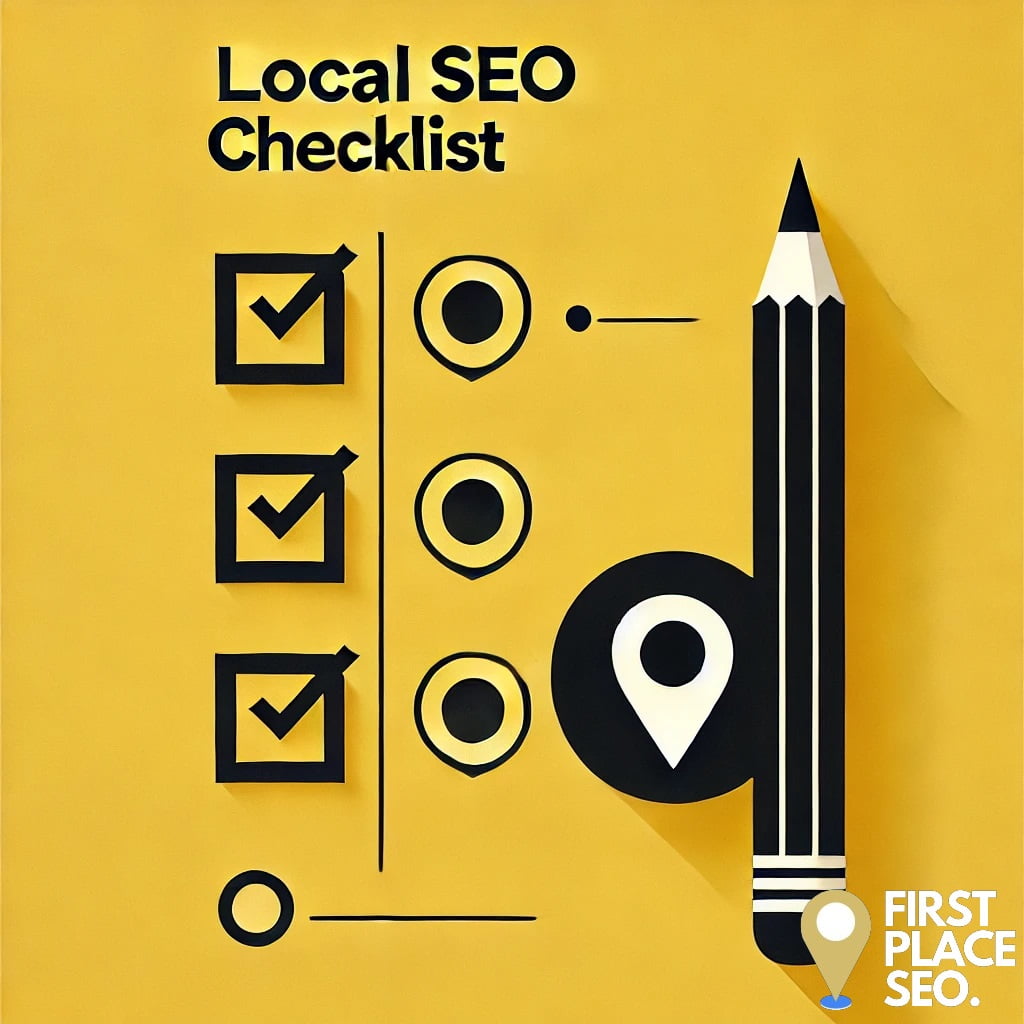Make Local SEO Work For You With Our Free Local SEO Checklist
People who still rely on word of mouth alone are missing out on the growth potential of Local SEO to succeed. Local SEO is optimising your online presence to attract more business from local “near me” searches. These searches take place on Google and other search engines like Bing and Duck Duck Go, they typically involve queries with local intent, such as “best SEO Company near me” or “SEO Services in London.” To ensure that your business is visible to potential customers when they search for products or services in your area, you need to implement a white hat Local SEO strategy. This Local SEO checklist is designed to guide you through the steps necessary to optimise your website and online profiles, helping you achieve higher rankings in local search results and attract more customers to your business.
1. Set Up Tracking and Analytics
Before you begin any Local SEO campaign, you need to establish a baseline by setting up tracking and analytics. This will allow you to measure the effectiveness of your efforts and make data-driven decisions.
Keyword / Rank Tracking: Use tools like BrightLocal to monitor how your business ranks for specific keywords in your target locations. Geo-grid reports can be particularly helpful for visualizing your rankings across different areas within your locality.
Google Search Console (GSC): GSC is a free tool that provides insights into your website’s search traffic and performance. It helps you understand which queries bring users to your site, how your pages are performing, and identify and fix issues that might be affecting your search rankings.
Google Analytics (GA): Google Analytics offers in-depth data about how users interact with your website. You can track metrics like page views, session duration, bounce rate, and conversion rates. Setting up conversion tracking is essential to measure actions like form submissions or phone calls.
Call Tracking (Optional): For businesses that rely heavily on phone calls, using call tracking software like CallTrackingMetrics or CallRail can help attribute calls to specific marketing channels. This is particularly useful for measuring the ROI of your Local SEO efforts.
Facebook Pixel (Optional): If you run ads on Facebook or Instagram, installing the Facebook Pixel on your website can help you track user interactions and retarget visitors, thus enhancing your overall marketing strategy.
2. Build a Strong Technical SEO Foundation
A solid technical foundation is critical to the success of your Local SEO efforts. Ensuring that your website is technically sound will prevent issues that could hinder your search visibility.
SSL Certification: Your website should be secured with an SSL certificate, ensuring that it serves pages over the HTTPS protocol. This not only protects user data but is also a ranking factor in Google’s algorithm.
XML Sitemap: An XML sitemap helps search engines like Google index your site more effectively. Ensure that it’s properly configured and submitted to Google Search Console. Tools like Yoast or RankMath can automatically generate and manage your sitemap if you’re using WordPress.
Robots.txt File: The robots.txt file instructs search engines on how to crawl your website. Ensure that it is correctly configured to avoid blocking important pages from being indexed. Again, plugins like Yoast or RankMath can assist with managing this file.
Mobile-Friendly Test: With a significant portion of local searches occurring on mobile devices, it’s crucial that your website is mobile-friendly. Use Google’s Mobile-Friendly Test tool to check your site’s responsiveness and make necessary adjustments.
WordPress Settings: If you’re using WordPress, double-check that the “Discourage search engines from indexing this site” option is not enabled. This setting, found under Settings → Reading, can prevent your site from appearing in search results if checked.
3. Create and Optimize Local Listings
Your Google Business Profile (GBP) is one of the most important assets in your Local SEO strategy. However, it’s also essential to optimize your presence on other platforms.
Google Business Profile: Claim and verify your GBP as soon as possible. This profile is crucial for appearing in Google’s Local 3-Pack and Maps results. Ensure your Name, Address, Phone Number (NAP) information is accurate and consistent. Update your profile regularly with business hours, photos, and services offered.
Bing Places: After setting up your GBP, import the information into Bing Places. This ensures consistency across major search engines and allows you to capture additional search traffic from Bing users.
Apple Maps: Many iPhone users rely on Apple Maps as their default navigation tool. To reach these users, create and optimize your business listing on Apple Business Connect.
Yelp: Yelp is another important platform for local businesses, particularly in industries like dining and services. Claim your Yelp profile and ensure it is fully optimized with accurate business information, photos, and categories.
Yahoo: Although not as prominent as Google or Bing, it’s still beneficial to claim and optimize your business listing on Yahoo via Yext.
4. Enhance and Manage Your Social Profiles
Social media profiles serve as trust signals to both search engines and users. They also offer additional platforms to engage with your local audience.
Facebook: Create and optimize a Facebook business page, ensuring that all information is accurate and up-to-date. Use it to engage with your community, share updates, and gather reviews.
Instagram: Particularly useful for visually-driven businesses like restaurants, boutiques, or salons, Instagram allows you to showcase your products or services creatively.
LinkedIn: Ideal for B2B businesses, LinkedIn can help you connect with other professionals in your area and establish your brand as an authority in your industry.
YouTube: Consider creating a YouTube channel if video content is part of your strategy. Optimized videos can rank well in search results and provide additional exposure for your business.
5. Generate and Manage Online Reviews
Online reviews are a critical component of Local SEO, influencing both rankings and customer trust.
Google Reviews: Encourage satisfied customers to leave reviews on your GBP. Google reviews are a significant ranking factor and can greatly impact your local search visibility.
Facebook Reviews: Facebook reviews contribute to your business’s credibility and can influence prospective customers who are researching your business.
Yelp Reviews: Yelp reviews are not only important for your Yelp profile but are also syndicated to other platforms like Apple Maps. Maintaining a high rating here is essential.
6. Build and Maintain NAP Citations
NAP citations are online mentions of your business’s name, address, and phone number. Consistent and accurate citations across the web help establish trust with search engines and improve local search rankings.
Local Directories: Submit your business information to reputable local directories such as Yellow Pages, Chamber of Commerce, and BBB. These citations help to increase your visibility and credibility.
NAP Consistency: Regularly audit your citations to ensure that your NAP information is consistent across all platforms. Inconsistent information can confuse search engines and harm your rankings.
7. Develop and Promote Locally Relevant Content
Creating content that resonates with your local audience can significantly boost your Local SEO efforts.
Local Blog Posts: Write blog posts about local events, news, or issues relevant to your community. This not only attracts local traffic but also positions your business as a local authority.
Geo-Targeted Content: Incorporate local keywords and phrases into your content to better target your local audience. For example, a plumber in Los Angeles might create content around “how to fix a leaky faucet in Los Angeles.”
8. Optimise Your Website for Local Search
Your website should be fully optimized to rank well in local search results. This includes both on-page SEO elements and overall website structure.
On-Page SEO: Optimize your title tags, meta descriptions, headers, and content with local keywords. For example, a law firm in Chicago might optimize a page with the title “Best Personal Injury Lawyer in Chicago.”
URL Structure: Use a logical and descriptive URL structure that reflects the content of each page. For example, a service page might have the URL www.yourwebsite.com/london-seo-services/.
Internal Linking: Ensure that your pages are well-linked internally, helping both users and search engines navigate your site more effectively.
Content Uniqueness: Avoid duplicate content by ensuring that each page on your site is unique and offers valuable information to your visitors.
9. Incorporate Schema Markup
Schema markup is a form of microdata that helps search engines understand the content of your website and present it more effectively in search results.
LocalBusiness Schema: Implement LocalBusiness schema on your website’s homepage or contact page. This helps search engines better understand your business’s location, services, and other essential details.
Service Schema: For service-oriented businesses, adding Service Schema to relevant pages can help highlight specific services you offer and the areas you serve.
10. Leverage Video Content for Local SEO
Video content is increasingly important for Local SEO, especially given the popularity of video search results on platforms like YouTube and Google.
Create Engaging Videos: Produce videos that are relevant to your local audience, such as tutorials, customer testimonials, or behind-the-scenes looks at your business.
Optimise Video SEO: Ensure that your video titles, descriptions, and tags include relevant local keywords. Additionally, include a link back to your website and your NAP information in the video description.
11. Get Quality Backlinks
Building quality backlinks from reputable sites is essential for improving your local search rankings.
Local PR and Sponsorships: Partner with local organisations, sponsor events, or contribute to local blogs to earn backlinks from reputable local sources.
Industry-Specific Websites: Get your business listed on industry-specific websites and directories. For example, a law firm might seek backlinks from legal directories or websites like Super Lawyers.
12. Enhance Website Performance
A fast, well-performing website not only provides a better user experience but is also favoured by search engines.
Page Speed Optimization: Use tools like Google PageSpeed Insights to analyse and improve your website’s load times. Focus on optimizing images, leveraging browser caching, and minimizing code.
Core Web Vitals: Pay attention to metrics like Largest Contentful Paint (LCP), First Input Delay (FID), and Cumulative Layout Shift (CLS) to ensure your website meets Google’s performance standards.
13. Track, Analyze, and Adjust Your Local SEO Efforts
Local SEO is not a one-time task but an ongoing process. Regularly track your progress, analyze the data, and make necessary adjustments to stay ahead of the competition.
Use SEO Tools: Leverage tools like Ahrefs, SEMrush, and Moz to monitor your rankings, analyze your competitors, and find new opportunities for growth.
Regular Audits: Conduct regular audits of your website, local listings, and citations to ensure everything is up to date and optimized.
Adapt to Changes: Stay informed about changes in local search algorithms and industry best practices. Adjust your strategy as needed to maintain or improve your rankings.
By following this comprehensive Local SEO checklist, you can significantly improve your visibility in local search results and attract more customers to your business. Remember, Local SEO is an ongoing process that requires continuous effort and adaptation to stay ahead of your competitors. Implement these strategies consistently, and you’ll see a substantial increase in your local search rankings, website traffic, and ultimately, your business revenue.



